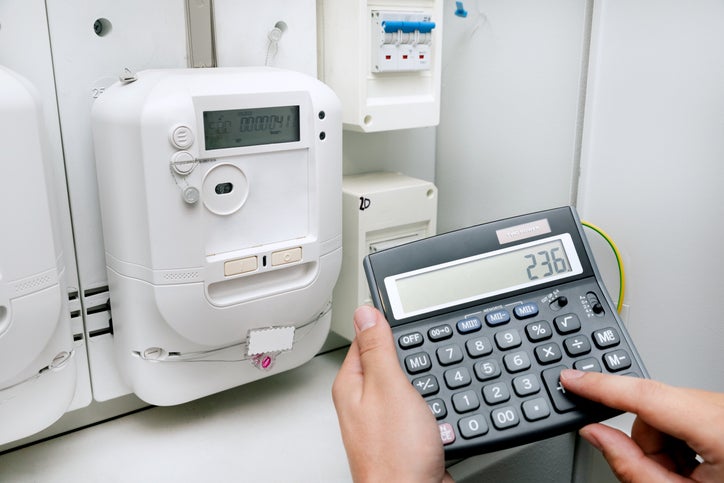* By submitting your details you agree to our terms and conditions and privacy policy . We promise we won’t share your data with others for marketing purposes.
Compare business electricity rates

Business electricity is different. No price cap & no cooling off

Compare, switch & renew business electricity to beat price volatility

Bionic is the comparison site for your small business
Compare Electricity Rates
By clicking 'Compare Electricity Rates' you agree for us to search your current energy supplier and usage through industry held data. Enter manually

We compare from a panel of business energy suppliers
No long forms. Start a comparison with just your postcode. We use smart data to find energy info.
Compare quotes from a panel of energy suppliers. Including big names and specialist providers.
An energy expert will talk you through the quotes on screen and support you with the switch.
Why compare...
business electricity rates?
Business electricity rates are constantly changing, and without a fixed deal, you could be overpaying on price. Loyalty to your supplier doesn't always pay when it comes to business electricity. Suppliers will often keep the best rates for new customers only, to entice them in. Here’s why you should consider running a business electricity comparison and switching:
- Avoid out-of-contract rates - Have you noticed a sudden rise in your payments? You might be paying out-of-contract rates. Switching now could shave money off your electricity bill, and if you really don’t want to switch, we’ll get to work and negotiate a better price with your current supplier.
- Lock in for longer - Energy markets are unpredictable. For peace of mind, it’s best to lock in the lowest rate now, for longer. We can organise competitive deals for 1-4 years, depending on what your business needs.
- Trusted suppliers – No one wants their supplier to go bust. We work with a panel of trusted suppliers who offer reliable service with great business electricity rates. We’ll manage the admin with them so you can get back to running your business.
Click to compare today's rates or speak to one of our tech-enabled energy experts on 0800 860 6833
What are the latest business electricity rates?
When it comes to business electricity, the size of your business can be determined by the amount of electricity it uses.
To give you an idea of how much your business should pay for electricity, here are the latest business electricity rates per kWh and standing charges for June 2025. We've also included average annual bill size to help you compare.
| Business size | Average annual usage (kWh) | Electricity unit rate (per kWh) | Electricity standing charge (daily) | Estimated annual bill | Ready to switch? |
| Micro Business | 5,000 to 15,000 | 25.0p | 55.5p | £2,668 (based on annual usage of 10,000 kWh) | Compare rates now |
| Small Business | 15,000 to 25,000 | 24.9p | 60.9p | £5,232 (based on annual usage of 20,000 kWh) | Compare rates now |
| Medium Business | 25,000 to 55,000 | 24.9p | 72.3p | £10,252 (based on annual usage of 40,000 kWh) | Compare rates now |
| Large Business | More than 55,000 kWh | 24.3p | 56.2p | £12,195 (based on annual usage of 55,000 kWh) | Compare rates now |
Note: Prices are correct as of June 2025. Rates and bill size may vary according to your meter type and business location. The prices you’re quoted may be different from the averages shown. The figures shown are the average unit rates and standing charges quoted by Bionic per business size from June 1 to June 6, 2025.
If you run a large business, Bionic offers the following services:
- Bespoke procurement
- Bill validation
- Metering and data collection
- Services for businesses with multiple sites
For more information, check out our guide for large business and industrial businesses.
What business electricty contract is best for you?
When you compare business electricity, you'll notice several different tariff types. Bionic’s tech-enabled experts will discuss your options to ensure you get the right deal. Below are the main types of electricity tariffs on offer to SMEs.
Fixed rate contracts
Unit rates and standing charges are fixed for the length of your contract.
Variable rate
With a variable-rate contract, your unit rate and standign charge can change, depending on market conditions.
Time of use tariff
A time of use tariff charges less for energy usage during certain hours.
Blend and extend
Your supplier offers to extend your contract at rates between what you’re paying now and the current market rates.
Flex approach
You bulk-buy energy in advance, giving you access to wholesale rates. Usually best for high usage businesses.
Pass through
Your business energy bill is split between fixed wholesale rates, and other charges like National Grid and TNUoS.
Deemed rates
Your supplier's default rates if you don’t arrange a fixed contract before moving into new premises. Avoid.
Out-of-contract rates
Suppliers put you on out-of-contract rates if you don't sort a new contract to start when your current one ends. Avoid.
Why get expert help from Bionic to compare business energy?
Click to compare today's rates or speak to one of our tech-enabled energy experts on 0800 860 6833
What costs make up a business electricity bill?
When working out the cost of your business electricity bills, there are two main things to look out for:
- Unit rate – Measured in kilowatt hours (kWh), this is the amount you pay for each unit of gas your business uses. If you're on a fixed tariff, this is the bit that stays the same for the length of your contract.
- Standing charge – This is a daily amount that is charged regardless of whether or not you use any gas. It covers the cost of managing your service and delivering gas to your premises.
But it's not just wholesale prices that affect the rates you'll be quoted. Business electricity suppliers base their rates on the size of your business size and its electricity consumption. And you should always find out whether the business electricity rates you're quoted include VAT. Although a reduced 5% VAT rate is available to certain businesses, most will pay 20% VAT on energy bills, which can really bump up your bills. If you're VAT registered, you should be able to claim this back though. You can find out more in our guide to VAT on business energy.
Your business credit score can also affect the type of deal and rates you're offered.
You may also need to pay other fees, such as the Climate Change Levy, Renewable Obligation, and the Feed-In Tariff.
If you're wondering how wholesale pricing is calculated and why a drop in wholesale prices isn't immediately reflected in the rates you pay or are quoted, then our guide to how power is bought and sold explains it all.
How to find who supplies your business electricity
You might need to get in touch with your energy supplier if you have an issue with your bill, a complaint, or you're moving premises. If you can't remember who supplies your business electricity, the simplest way to find out is by checking your latest bill.
If you've switched with Bionic, get in touch and we can let you know who your current supplier is and compare quotes for your next contract if the time is right. At Bionic, we work with a panel of business electricity suppliers, including:
| Supplier name | Electricity unit rate (kWh) | Electricity standing charge (daily) | Ready to switch? |
| British Gas | 26.3p | 52.5p | Compare rates now |
| BG Lite | 26.1p | 56.0p | Compare rates now |
| EDF Energy | 24.6p | 55.3p | Compare rates now |
| EON Next | 25.6p | 33.7p | Compare rates now |
| ScottishPower | 22.5p | 80.5p | Compare rates now |
| Smartest Energy | 24.0p | 57.2p | Compare rates now |
| Valda Energy | 23.8p | 74.1p | Compare rates now |
| Yu Energy | 22.7p | 87.4p | Compare rates now |
We can also compare rates from other suppliers not listed above, including Crown Gas & Power, SSE, TotalEnergies, Corona, Engie, and more.
If your business uses more than 55,000 kWh of electricity each year, suppliers will classify you as a large business and handle your supply differently. To find out more, check out our guide to large business energy.
If you can't find a recent electricity bill, you can find out who your supplier is by contacting your local network operator (the company responsible for the wires that carry electricity to your premises).
You can do this by entering your postcode into the Energy Network Association search tool or by calling the number below for your regional network operator:
| Region | Number |
| North Scotland | 0345 0262554 |
| South & Central Scotland | 0300 1010300 |
| North East England & Yorkshire | 0800 01113332 |
| North West England | 0800 1954141 |
| North Wales, North Shropshire, Cheshire & Merseyside | 0330 1010300 |
| South Wales & South West England | 0800 0963080 |
| East & West Midlands | 0800 0963080 |
| Central Southern England | 0345 0262554 |
| Eastern England, South East England and London | 0800 0294285 |
If you've switched with Bionic, you can call us to find out. We can help you compare, switch and renew when the time is right. We only carry out a business electricity comparison from a panel of trusted energy suppliers that provide quality customer service and great rates.
What are average electricity rates by business?
If you’ve never switched business electricity, you’ll not be on your supplier’s most competitive rates and will be overpaying. This is when it can help to compare what you’re currently paying with the average rates paid by other businesses in your sector.
If, for instance, you run a restaurant, asking how much energy an average restaurant uses every year and comparing the costs with the rates you pay will instantly highlight how much you could save by switching suppliers.
| Business type | Annual usage | Unit rate (per kWh) | Standing charge (daily) | Cost per year |
| Coffee Shop | 19,000 kWh | 25.6p | 56.7p | £5,071 |
| Hair Salon | 40,000 kWh | 26.1p | 57.2p | £10,649 |
| Small Farm | 30,000 kWh | 26.4p | 54.2p | £8,118 |
| Dental Surgery | 38,000 kWh | 26.0p | 57.6p | £10,090 |
| Restaurant | 25,000 kWh | 26.1p | 55.5p | £6,728 |
| Newsagent | 11,000 kWh | 25.7p | 54.3p | £3,026 |
Note: Prices are correct as of April 2025. Rates and bill size may vary according to your meter type and business location. The prices you’re quoted may be different from the averages shown.
Click to compare today's rates or speak to one of our tech-enabled energy experts on 0800 860 6833
How Bionic business electricity comparison works
Compare business electricity quotes in three simple steps
1
Start your quote online
Start a business electricity comparison with just your postcode
2
We do the comparison
We compare quotes from our panel of business electricity suppliers
3
You choose your new supplier
You choose the supplier and rates you like best
What do I need to compare business electricity?
We can start your business electricity comparison with just your postcode. And we use smart data to help cut the amount of form-filling. But it could help if you have the following info to hand.

The name of your current supplier and your account number

The address of your business

Your monthly or annual business energy usage

Recent meter readings
Business Electricity FAQs
To help you understand more about comparing business electricity and switching suppliers, here are the answers to some of our most frequently asked questions.
Our team shares essential knowledge on business energy

Is there an energy price cap for business?
There is no price cap on business energy. Instead, government support for businesses is given by way of a discount on energy unit rates. Here’s all you need to know.

Is commercial energy different to household energy?
Although it comes from the same sources – and possibly the same supplier – business energy is different to household energy. Here’s all you need to know.

How does being a micro business affect your energy contract?
Being a micro business affects the terms of your business energy contract. But what is a microbusiness? And does being one get you a better energy deal?

Why are energy prices so high? Are they still going up?
What is going on with energy prices in the UK? There's an energy crisis across the globe, with a number of major issues causing price volatility. Here's all you need to know.
Not your usual boring business content!

Sign-up to The Backbone, our free fortnightly newsletter for anyone who owns, runs, or works in one of the millions of businesses across the UK. Get the inside track from real business owners just like you




